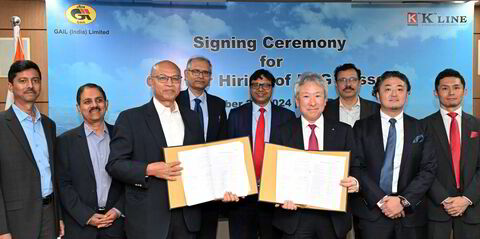Up to 90 new liquefaction trains could be needed by 2030 if demand forecasts hold true.French supermajor Total reckons LNG growth will be 5% per annum going forward. “Even if this might sound very reasonable compared to past trends it means a need of close to 400 million tonnes per annum of additional LNG production compared to 2010,” said Total Gas & Power president Philippe Sauquet in an investor update this week.Factoring in the final investment decisions already taken, this leaves around 340 million tpa of demand to be met, he added. “This means roughly between 80 and 90 new liquefaction trains to be identified, developed, built — more than all the liquefaction plants existing or in construction today worldwide. So there’s a clear opportunity for new projects.”Sauquet noted that the worldwide gas market has been growing at an average of 3% per annum over the past 10 years. That rate is now projected to slip to 2% to 3%, although this is said to be “on the cautious side”.“As I said, we are very confident about gas demand growth but we feel even more confident about LNG growth,” said Sauquet.Reliability in the LNG market has also improved immensely in the past 40 years, he said. The sector has recently shown its “exceptional flexibility” to respond to “unanticipated customer demand”, most effectively after last year’s nuclear meltdown in Japan.China and India are going to be two of the key LNG importers, according to Total. Europe, meanwhile, is more difficult to predict as overall energy demand is slipping.However, Total chief executive Christophe de Margerie noted that despite “weak” demand, there will hopefully be a switch from coal to gas when deciding on how to replace lost nuclear. “I don’t think that countries like Germany could stay on this policy of replacing nuclear by coal,” he said.“Knowing of what is being discussed today with different pipes in the region, potential politics, it’s interesting to see Germany is (almost) willing to talk about long-term access to gas even if, for the time being, they don’t approve of it.”Gas is greener than coal and can complement intermittent renewable energy, which is growing in developed countries, he noted. The issue with LNG, however, is that it is a “long-lasting project” in terms of development and production timeframes, as well as being highly capital intensive.It is, though, “one of the best way(s) not only to supply the market but also to make a very sustainable source of profit in a sustainable way,” said de Margerie.
Latest Jobs
LNG a one-way ticket for Total
French player sees increasing need for global output capacity.
28 September 2012 14:39 GMT
Updated
28 September 2012 14:39 GMT
By


